Broadway newcomer Common and stage veteran Stephen McKinley Henderson talk Between Riverside and Crazy

- Oops!Something went wrong.Please try again later.
Between Riverside and Crazy is finally coming to Broadway after winning the Pulitzer Prize for Drama in 2015.
It premieres on the Great White Way with another stage newcomer, Common, who will be making his Broadway debut. Common is one of the few fresh faces in the show, as most of the original cast from the Off Broadway production of the Stephen Adly Guirgis play are making the jump.
That includes veteran character actor Stephen McKinley Henderson, who has forged a long career on the stage, particularly in the works of Guirgis and August Wilson.
The two men play father and son: Walter "Pops" Washington (Henderson) and Junior (Common). Pops is a retired New York City policeman and recent widower when Junior is released from jail. He returns to his family's rent-controlled apartment on Riverside Drive, fighting against the landlord and the NYPD, as Walter is pursuing a discrimination suit after being accidentally shot by another officer. But Junior complicates things when he brings his girlfriend, Lulu (Rosal Colón), and Oswaldo (Victor Almanzar), a recovering addict, to spend time at the apartment.
In a review of the 2014 Off Broadway production, EW called the show Guirgis' "most accomplished piece to date." It continued: "Compared to his other street operas, it's almost cuddly in its intimate family-living backdrop. In this case, cuddly also entails booze, drugs, and prostitutes."
In between rehearsals and an evening preview performance in the run-up to their Dec. 19 opening at the Hayes Theater, Common and Henderson sat down to chat about Broadway debuts, being the newcomer in an ensemble, and why acting requires that you learn the musical style of a playwright.
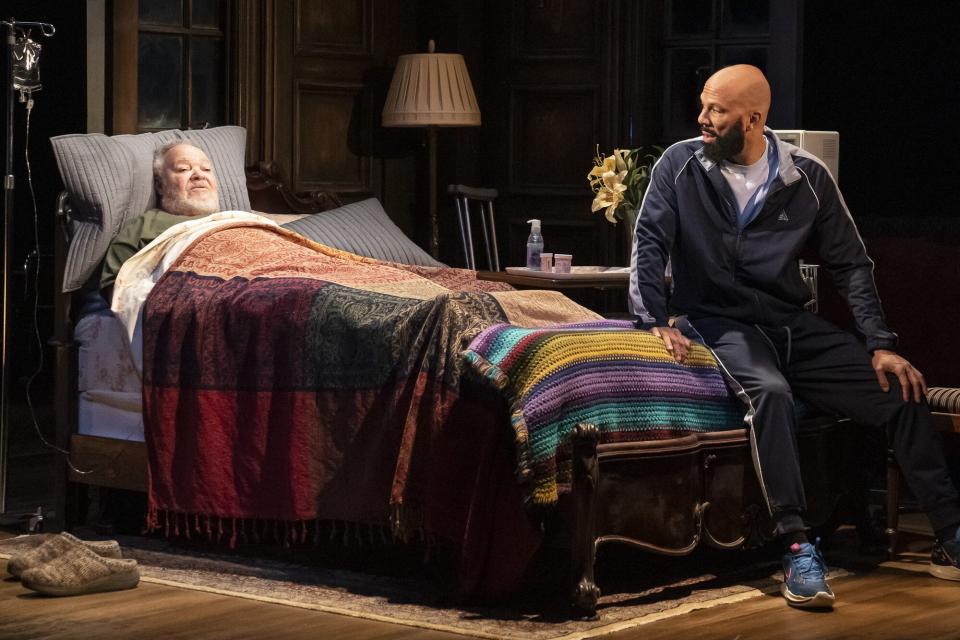
Polk PR
STEPHEN MCKINLEY HENDERSON: Common, how has it been? This is your first Broadway show.
COMMON: It's been one of the greatest lessons in life that I've had artistically. This is totally a new discipline, as far as theater goes. The practice of it, the commitment and the attention to detail I really appreciate. Once I began acting, I wanted to act every day. Just to work on the craft and learn and grow. My day job of doing music and doing other things was paying the bills, so I wasn't able to do that. But now, having this opportunity to actually work with our talented cast and talk about character and go back and forth about what works and doesn't work, it's been one of the greatest experiences. I'm still learning. 'Cause we are in previews, and we doing it at night and then still getting together and jamming during the day and coming in with stuff that we going to try out in front of the audience.
HENDERSON: I must say, you sure been able to hang. We've had some rough road.
COMMON: Oh, thank you, brother. I got to ask you, this is my first one. I don't know how many productions you've had, but it's a long history. What is anything that is new when you get into something? You are a master.
HENDERSON: No, it masters me. Because you have to give it all you got. But it is amazing to me to understand that no matter where you do it — if you do it in Toledo or you do it in Poughkeepsie or you do it on Broadway — wherever you do it, if you got a different way to do it, then you don't deserve to do it either place. You got one standard and it's your best. Whatever stage you're performing on, it's your best. What keeps coming back is that the amount of care is the amount of trepidation you have. Because the more you care, the more you want it to be greater delivered. You want to make sure you serve the play. And we got such a great one. But it is always show specific too. It is really different from each play to each play. Because each play demands something different. And it's a different part of your life that you got to bring to it.
COMMON: Does the language of writers make you have to use different types of muscles or skills?
HENDERSON: It's thought groups and breath groups. It's like phrasing in a song or playing an instrument. Some playwrights ask you to take in a lot of air so you can get through that thought. You can take a rest, a break here and a break there, but you've got to hold the thought group. You're matching thought groups and breath groups. If you listen to the phrasing of like Sarah Vaughan, Nat Cole, Frank Sinatra, you listen to these great phrasers take that poetry and phrase it. Acting is similar. Like August Wilson is the blues, he's got that blues meter. He say, "I ain't say that. You ain't hear me say that. I ain't say nothing like that." You know what I mean? He got that repetition, that three. But Stephen [Adly Guirgis], man, he got that jazz, classical thing, so you've got to take some air in to get through. It's a joy to have the challenge of this particular writer.
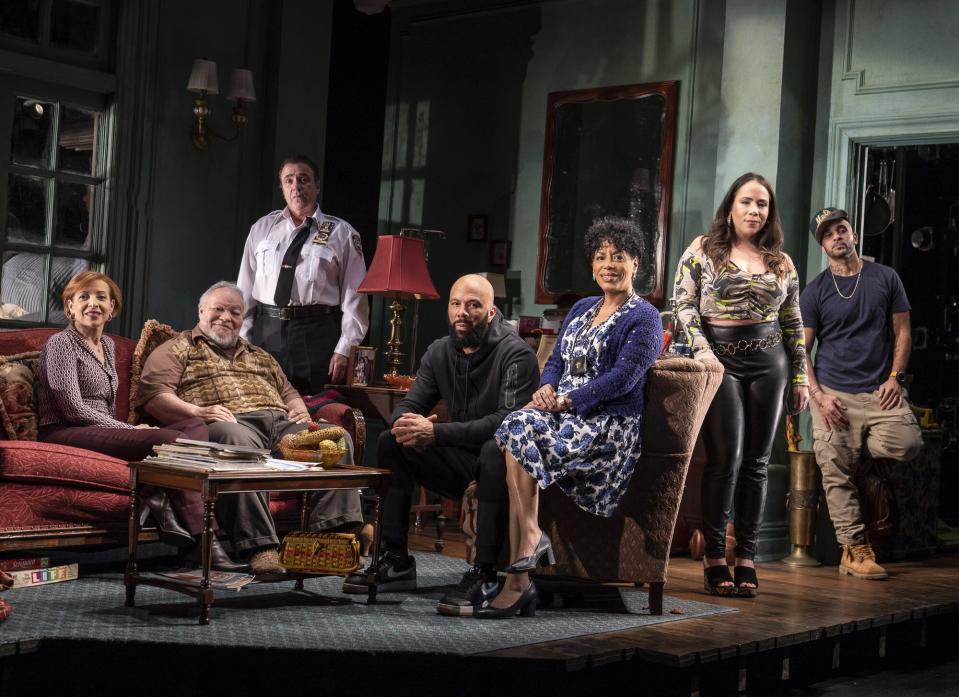
Polk PR
COMMON: Yeah, this is my first play on stage and this writing has made me understand what you're saying about breath. I never thought about it, but I'm really paying attention to breath now. And taking these thoughts in. It's a new understanding for me.
HENDERSON: We've got to talk about rock too. Because Stephen has a great respect for rock music as well. There's times that you realize that's the emotional level of it. That emotional level takes over. When you coming at me sometimes, woo, man, that's hard rock.
Everyone else in the play has done the play together twice before and built it first when he was writing it. Then we went on to the next level and we did it and won the Pulitzer and all that stuff. So what I really want to know, when you came in, did you feel the love we were trying to extend to you? Because I know it had to be some pressure. Those first few days, what was that like?
COMMON: The first few days I felt you all embraced me. From the time me and you got to build, you gave me some stuff that I'm going to walk with forever as an actor and as a person. That in itself made me know, "Okay, look, I'm welcome here. I gotta deliver." My thing was to come in and whatever I could bring, do my best and give my all, but also be open to you all and the insight and the advice and the guidance. In one of the earlier table reads, Liza Colon-Zayas, who plays Church Lady, pulled me aside and she said, "When they told me that we were going to have a different Junior instead of Ron Cephas Jones, she was like, 'Ah, man. That's the family.' But you doing your thing, man."
Liza don't give compliments. She's straight, no chaser. So, that was one of those, "You with us, we got you. We see that you care. We see that you're going to give your best. We know you coming in humbly." I always use the metaphor of being a freshman in high school and y'all like seniors, juniors. Y'all been around each other and been doing it. It was a lot of love more than anything. I started eventually feeling like I'm part of the process and taking in everything. One of the things I love to do most in life is learn. I want to learn. I'm a seeker. The fact that I was getting information from you and Liza and Michael [Rispoli], this is already feeding me enough for what I was seeking in this process — just growing as an actor.
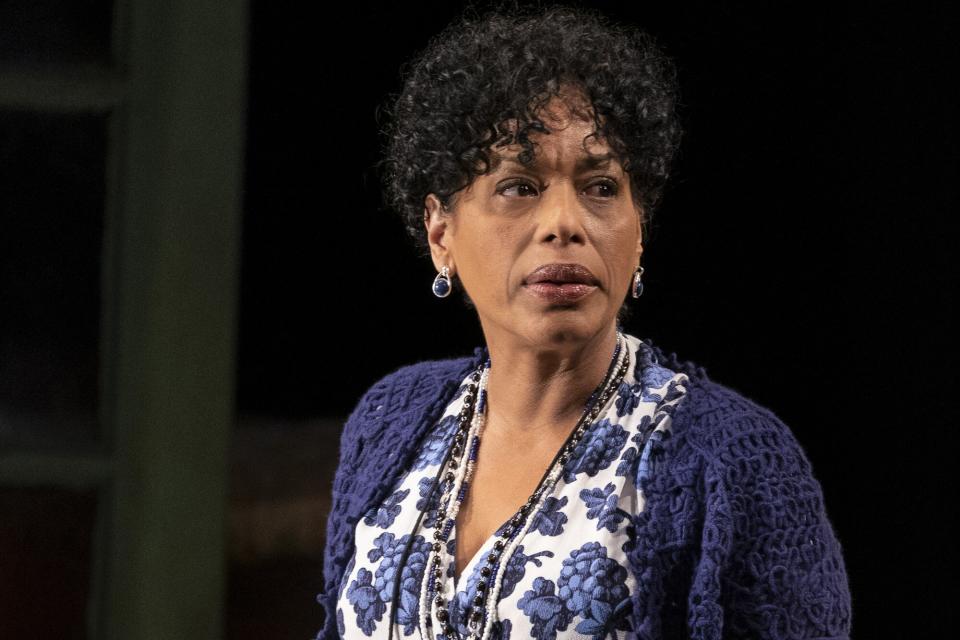
Polk PR
Stephen, I'm the new cat. All salutations to everybody who did it before me, but was there anything that you felt that I was able to bring that made you see this character from new eyes or a different place?
HENDERSON: Yes. There's certain things that are required to play the role. And then there's that other thing, that fingerprint, that DNA that anybody that does a role brings, of their own humanity. Your concern for society and civilization's concern for human rights and so forth. When you do the scene with Aldo [Almanzar], it's very clear that you are the right person that was selected to help him. You really have a true concern for him. That's unique of you. The other actors had that to do. But it's the humanity that you bring to the work because this is work that you actually do. There are people who come, who have a degree of celebrity, who have a following, and they come in and they don't come in as humbly as you. To bring that humanity with it, we grateful to have you.
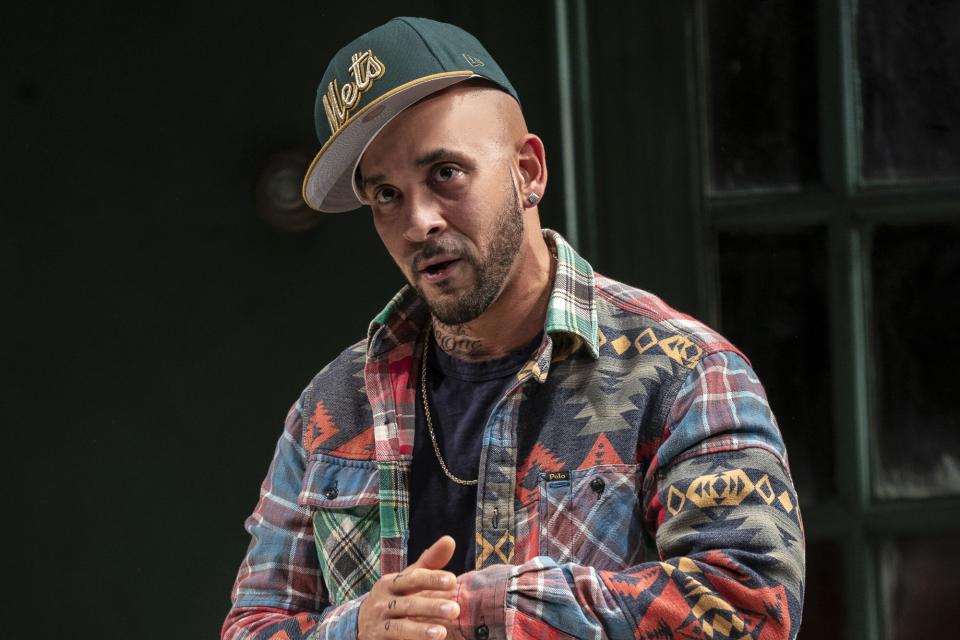
Polk PR
COMMON: Thanks brother. I'm grateful to be here. Does your process of research, as far as developing the characters, does it change from film to theater for you?
HENDERSON: No. The research side doesn't change. But film requires a different discipline than the stage requires. The essence of it is acting. Acting started as a language art. Film started as an image, silently. It's pictures. Images. When you marry the language art with the image art, that's when you get that really good stuff. But the research into the character is an in-depth thing because you are also going into yourself. You're going into the character and what the character goes through. But you are also saying, "Okay, now what part of that has a synchronicity with me? Where do I find that? Where does it coincide with something in my life?"
With the craft, there are things you have to be private about it. Because you've giving something of yourself, and it's in the work. But is there anything you'd like to share about how you are finding Junior? Is there something new that you are getting at now in terms of the craft of acting from doing this Broadway experience?
COMMON: I love what you just said because it's important when we talk about art that we understand that part of it is you share your experience, so people receive something and they understand you more. But then some of it is so sacred that it is not meant for that. It's so close to your spirit and your heart, it's like your child. You don't let nobody touch your child. As far as the difference working in theater and on a film, it don't change for me as far as what work I'm going to put into my own development. This was the first time I got to really work with other actors and have this much time to talk about our relationships and the history of these characters. I've had a rehearsal on a TV project or film, but never four or five weeks. To have that much time allocated to rehearsal is great. That's one of the biggest differences. And then also, you don't get no trailer. [Laughs] You share that dressing room sometimes. When they were like, "Yo, put your mic on," I don't know how to put my mic on! But this truly brings me to my artist's self more than a lot of stuff that I've done. Theater, live music, and even certain film projects, where the work is that great and the writing is that great, you get to get into the art of things.
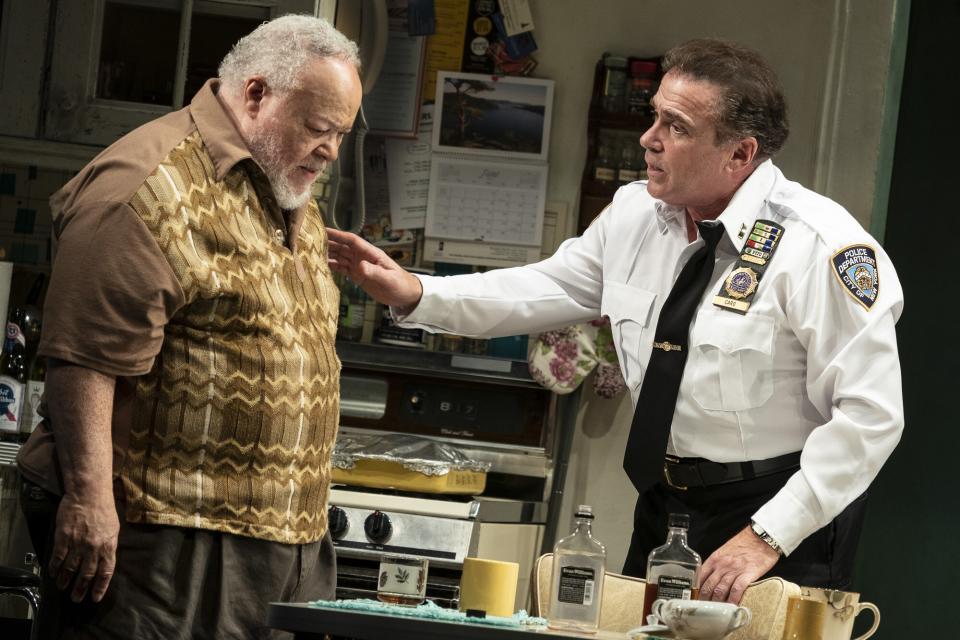
Polk PR
HENDERSON: How are you adjusting to the different audiences? Because every audience is not the same.
COMMON: First of all, I had to adjust when we went from rehearsal to audience, even the first dress rehearsal, that was my first time learning, "Oh, I gotta stop for a second and let them clap a little." They're clapping or they laughing. Certain things, you're like, "I didn't know this was funny." And then certain nights, "Oh, this is funny to this audience, but this ain't funny to them."
HENDERSON: And in a scene we do together, there's times when you hear them just go, "Ooooh." Every audience member hears that. That's a part of the scene.
COMMON: Yeah, the audience is like part of the play at that point.
HENDERSON: The experience tonight, it's their experience.
COMMON: That's one of the things I really do love. It's no editing and no going back. You just there. So that living organism that we got there is just for tonight. It's alive tonight. This is what we feeling and what energy we bring at this moment. I might do something different, you might do something a different way and I respond in a different way. It might come to you in that moment. The fact that we only had that for that night is a beautiful thing to me. That's the beauty of theater. Growing up, I always loved going to plays. I would always feel inspired. I would always feel like, "Man, I could be something in life."
What was the thing that clicked for you and made you say, "Man, I really want to do this" about theater and acting?
HENDERSON: Well, you have to go to Hollywood, New York, somewhere to be in TV and the movies. I grew up in Kansas. All I had to do was go down the street and be in a play. My first thing I loved was poetry. That was the first thing that got me. I remember I was a freshman in high school and this teacher asked me to be in this play. It was being a part of something that was larger than me. We knew that we were doing something in a unified way. And it was creative, not destructive. It pulls people into creative behavior and then they understood that they could be something. Because if you can play a character, then you can have a profession. You can be a doctor, you can be a lawyer. I didn't know how far I was going to go with it. We did it after school and sometimes people who did community theater, they go do their job and they weren't never trying to go nowhere to be an actor.
COMMON: One of the things I love most about acting is it's a team effort. I love that team camaraderie. Some days you might not be feeling the best, but somebody else may just say something to get you there, or they may be in that scene and lift you up. That's why I say I want more creative programs in our communities.
HENDERSON: You find out you got people supporting you and believing in you that you didn't even know. It is divine because that's how you get from this level to that level. I went from Kansas City to Chicago and Chicago to New York.
COMMON: But it's amazing how you find your purpose in something that you love. God will take you on that path because that's what's supposed to be. You're supposed to distribute his divinity through the work you do.
Related content:

